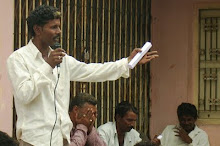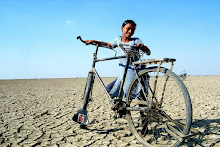Indian Express: National: Sunday,
April 09, 2017.
 |
| Towards a brighter future: (Left) Osama Manzar of Digital Empowerment Foundation briefs the parents of Rann shala students; children run on the barren land of Little Rann of Kutch. |
In the
remote salt marshes of the Little Rann of Kutch in Gujarat, wi-fi powered
laptops are bringing children back to school.
Four-year-old
Vishnu Kabaliya recites the “Barakhadi” (the Gujarati alphabet set) in complete
sync with the audio and colourful animation popping up on the tablet on his
lap. Sitting cross-legged on a brown jute bag, he has a vice-like grip on the
tablet, preventing his classmates from even touching it. “I like watching Motu
Patlu (an animated sitcom series), but my favourite is the rabbit-and-hare
story,” says Vishnu, refusing to look up from the device.
In the
scorching salt marshes of the Little Rann of Kutch in Gujarat, wi-fi powered
tablets and laptops are drawing children of salt pan workers and members of the
Agariya community back to the Rann shalas, the government-approved makeshift
tent schools at Kharaghoda in the Surendranagar district of the state. “The
Rann shalas are now registering an increase in attendance. Earlier, of the 251
students enrolled in 14 schools, only 60-65 per cent would attend. Now, 95 per
cent do,” says Punabhai S Vakatar, the Sarva Shiksha Abhiyan (SSA) district
co-ordinator of Surendranagar.
The
Agariya community usually spends about eight months in the Rann, working in the
salt pans while their children attend the school here. They return to their
villages by mid-May.
Read |
Gujarat: Private school fees to be regulated from this academic session, says
Education Minister
The
excitement is palpable at the Manish Rann Shala, 30 km from the nearest
habitation of Patdi town in Surendranagar district, where the white “digi-van”,
which brings in the equipment an LCD screen, five tablets, a laptop, a laser
printer, a lamination machine and a camera has drawn all 21 of its enrolled
students, including Vishnu. “The children are very excited by the entire setup.
They do not mind staying back in school now. Earlier, it was difficult to get
all of them to concentrate as students of various classes and ages sit under
one small tent,” says Himmatlal N Patel, the teacher at the Manish Rann Shala,
where, apart from the tent, a small blackboard on a wooden stand is the only
other infrastructure.
What has
really got the attention of children these days is “Tublo” the local term for YouTube. Despite language
and digital barriers, children as young as four years old are using YouTube to
find their favourite Gujarati poems, rhymes, alphabet tutorials and
mathematical puzzles, says Rahul Chaudhary, co-ordinator of the project, Zero
Connect, the brainchild of three NGOs Digital Empowerment Foundation (DEF),
Internet Society (ISOC) and the Ahmedabad-based Agariya Heet Rakshak Manch
(ARHM).
While the
students dabble with web pages, they also have access to elementary study
material. “We have uploaded various Gujarati songs, an application with math
puzzles and alphabet rhymes,” says Shah Alam, the DEF co-ordinator, adding that
more applications will be installed on the tablets in the coming days.
“The
children also have access to video conferencing, which connects them to the
outer world. Through this, they will also study what their peers are being
taught in the cities and even across the globe,” says Harinesh Pandya,
director, AHRM.
Apart
from bringing children back to school, the technology is also digitally
empowering the population of nearly 5,000 salt pan workers. For one, video
conferencing is a massive step up in a region where mirrors are still used to
relfect sunlight and send out signals rigorous vertical flashing of a mirror
signifies a medical emergency.
Despite
its relative success, NGOs insist that the project is still in its nascent
stage, and will require “acclimatising” to the extreme environment here. “We
did not realise that even on such a barren, unobstructed piece of land, we
would face aligning problems. The earth’s curvature was hampering the signals
from the Wi-Fi tower we had set up at a location bordering the Little Rann of
Kutch. Then, after several tests, the tower was installed at Zinzuwada police
station, nearly 30 km from Patdi,” says Osama Manzar, founder, DEF.
“Of the
162 projects we are running in over 22 states, this is the first that is
operating from a moving vehicle. The rest are all stationary centres,” says
Manzar. The project, he says, aims to end the “600-year-old isolation” of the
Agariyas. “Poora desh jinka namak khata hai, unke liye kuch karna chahiye (We
should do something for the community that gives salt to the entire country),”
he says.
















.jpg)
.jpg)
.jpg)
.jpg)













No comments:
Post a Comment